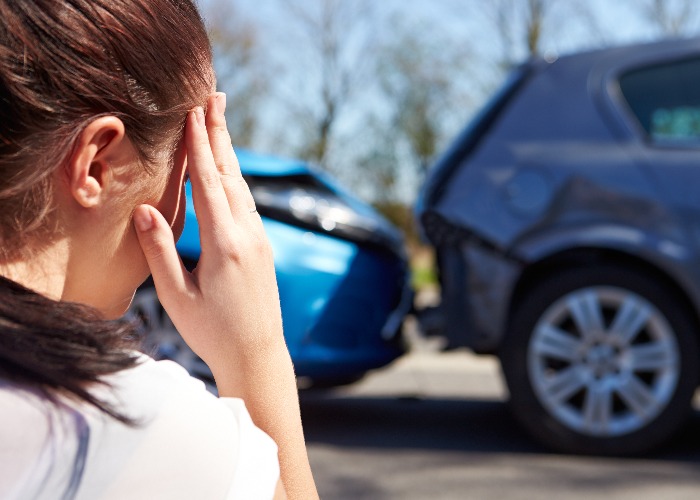My wife and I don't feel right claiming compensation after a car accident

Sometimes claiming for compensation, even when you're entitled to it, can make you feel uneasy following a genuine accident. John Fitzsimons speaks about events following his wife's experience.
Even when people are genuinely entitled to compensation, they can be hesitant in claiming it.
Last week my wife was involved in a car accident. Another motorist drove into the back of our car, which was stationary at the entrance to a roundabout, and thankfully they accepted full responsibility.
While the incident was relatively minor, my wife was injured and has been off work ever since.
Ah, you might be thinking, there’s a chance for some compensation! That was certainly the go-to reaction of a handful of people we know (after checking she was OK, obviously).
And you’re right; she is almost certainly entitled to make a claim, and in all likelihood win a decent payout that could run into the thousands.
But despite this, we both feel a little uneasy about doing so.
Get your car insurance sorted by comparing deals with loveMONEY
Where there’s blame, there’s a claim
At the risk of sounding like Jeremy Clarkson, I really can’t stand the blame culture that has developed in the last couple of decades.
Maybe it’s a British thing, but there is a small part of me that can’t shake the feeling that if you’re caught up in an accident, well that’s just jolly bad luck.
The other motorist didn’t intend to hurt my wife. He admitted he was distracted as his cat is poorly (yes, really) and has been incredibly apologetic and contrite ever since. It was an accident, not an attack.
It’s one thing if another person intentionally hurts you, or if you suffer some form of life-changing injury. But a relatively minor injury as a result of pure misfortune, an innocent mistake made by another person?
There’s something about pursuing a legal case in those circumstances that doesn’t quite feel right.
Encouraging the ambulance chasers

And then there is the issue of the ambulance chasers, the claims firms that promise to take on your case and then make a killing by taking a chunk of any payout you might win.
Our car was involved in a tiny incident years ago when one of my wife’s colleagues clipped it in the car park. We didn’t claim on our insurance, we just told them about the incident, as you are supposed to do.
Yet every single week we get multiple calls and texts from claims firms who smell blood and the chance to try to make a few quid, encouraging us to pursue a claim.
I have no doubt that somehow the details about our accident will end up in the hands of these claims firms, so we will get yet more calls. I can only imagine the volume of those calls will go up if we do actively start a case of our own.
The whiplash worry
My wife has been told she has whiplash. It’s a term that inevitably raises eyebrows, as it has been at the centre of numerous rows in the insurance and motoring community in recent years.
Some, including my own insurer Aviva, have declared that the UK is the whiplash capital of the world. It pointed to its own data, which found that in 2014 80% of the motor injury claims it received included whiplash, which it argued is far higher than figures in other countries.
The number of injury claims is rising, while the number of actual accidents is falling. What’s going on?
There are two linked issues here. For starters, there isn’t an awful lot of evidence that you need to provide to prove that you have whiplash to make a claim in the UK, certainly compared to in other nations. As a result, people that are involved in a minor shunt are encouraged to go for a claim by those very same claims firms, or the well-meaning friends who immediately think about the potential for compensation.
And then there are the scammers. In recent years, there has been an alarming growth in ‘crash for cash’ scams, where fraudsters essentially manufacture road incidents in order to make payout claims.
A report from the Insurance Fraud Bureau suggested that these scams are costing insurers around £340 million a year.
This is why the Government is looking to crackdown on whiplash, by capping the maximum payouts for injuries, which it claimed would reduce the average payout from £1,850 to just £425.
In addition, payouts would only be possible if medical evidence is provided, saving insurers a small fortune in the process and – in theory – leading to cheaper premiums. Indeed, insurers and the Government have claimed that these measures would lead to average savings of £50 a year.
Not everyone agrees though; analysis by campaign group Access to Justice has suggested that the savings are more likely to be a meagre £16.
A dirty word
Deep down, I know I’m being daft. My wife has been genuinely hurt, it wasn’t her fault, and the system is designed to help people that are injured get the money to pay for rehabilitation. She is going to need physio treatment, after all.
But the way that whiplash has almost become a dirty word has certainly affected my attitude towards pursuing a claim, as has our irritation at the seemingly-growing blame culture.
What do you think? Would you also feel uncomfrtable claiming compensation you are genuinely owed or is it just me? Share your thoughts in the comments section below.
Get your car insurance sorted by comparing deals with loveMONEY
Comments
Be the first to comment
Do you want to comment on this article? You need to be signed in for this feature